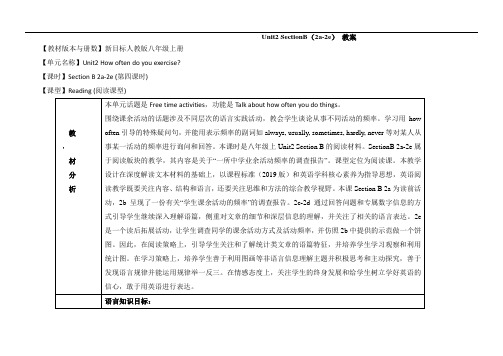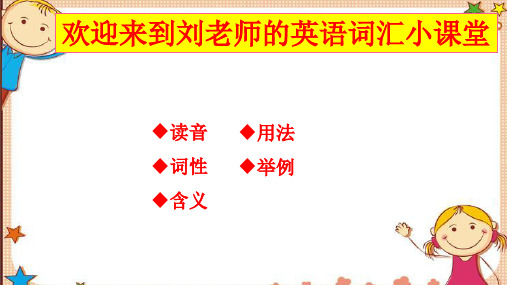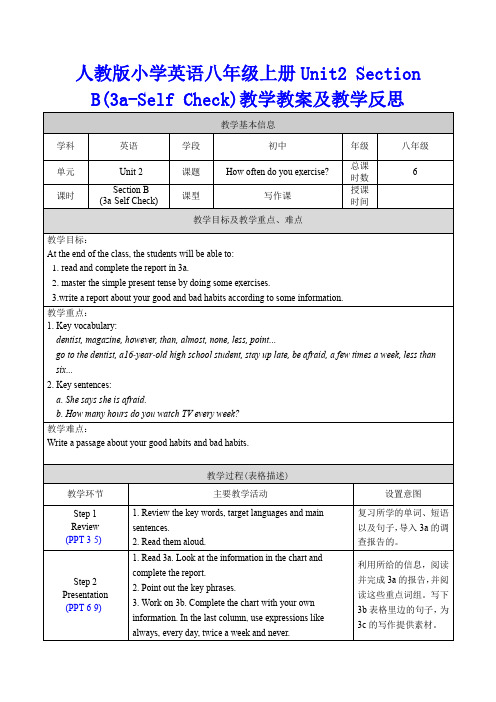人教版英语八年级上册unit2SectionB
人教版英语八年级上册Unit2 SectionB(1a-1e)优质课教案

P4-2b recorder
Step2
Play the recorder
Check the answer
Listen and finish2b Give the answers
P4-2b recorder
Step3
Show the target language :
to others.
Pairwork
Step5
Move around the room and give
support as needed.
Talk to each other
Step6
Ask pair of Ss to show their works.
Pairs of Ss show
their work
How often do you exercise?
Use the target language, and talk
to others.
Pairwork
Step4
Show the target language:
I exercise everyday.
Use the target language, and talk
Textbook
Task 1: Pairwork:How often do you drink milk?
Aim
To be familiar with the target language and the key words
1
Show the target language:
How often do you drink milk?
人教版八年级上册英语Unit2_SectionB课课件

sleep nine hours every night
Do you have a healthy lifestyle?
Are they in good health(=healthy)? Of course, they aren’t.
Why are they so heavy? Because their eating habits are bad. They like eating junk food
Their Free Time?
2b
What do No. 5 High school students do in their free time
Last month we asked our students about their free time activities. Our questions were about exercise, use of the Internet and watching TV. Here are the results.
Discuss How can we keep healthy?
Try to eat more healthy food and less junk food.
1. Eat rice for meals. 2.Try to eat vegetables every day. 3.Eat fruit every day. 4. Eat some meat sometimes. 5.Don’t eat the food with too much oil. 6. Drink some milk every day.
healthy/unhealthy
I think in our class, _____ students like upgdlwioslaaitiineynntncgiggnhitnhgcihongaoebtcsgmtmaotahiobTcmnpseclktmwViepemne.routg.oenrbtsnvikeiancirnt.le.litgs.sh.a.em(pceoinsu.gn-tproyn. g)
人教版八年级英语上册Unit2SectionB(1a-1e)教案设计

Unit2 Section B(1a-1e)优质课课件(安徽省)人教英语八年级上Unit2 Section b1a-1e教学设计来安县水口中学杨成扣一、教学日标:1、能够掌握课标要求的“四会”词汇:junk,coffee,health。
2、学会谈论饮食习惯,了解哪些饮食习惯是健康的。
3、能阅读关于介绍饮食习惯方面的文章。
学会养成良好的生活习惯和饮食习惯。
4、培养学生的逻辑表述能力,激发学生的积极思维,并使学生互相了解,增进友谊。
二、学情分析:对于本单元的一般现在时态,学生掌握较好,部分学生在本章节的听力部分略有不足,建议多听多练练。
三、重点和难点:1、区分how many/how much,health/healthy,different/difference2、掌握以下重点句子How often do you eat fruit?How many hours do you sleep every night?How often do you eat junk food?How often do you drink coffee?四、教学过程Step 1 Lead-in(导入)Greeting & free talkStep 2 Match the pictures(1a)Let students pay attention to the pictures. Say something about the pictures. Match the words with the pictures. Check the answers and then practice reading.Step 3 Ask and answer(1b)Pair workT: Now look at the conversation in lB, ask two students to read it o the class.Work with your partner. Please make your own conversations using the words in la. Forexample:A: How often do you eat vegetables?B: I eat vegetables every day.A: Do you like it?B: No. But my mother wants me to eat it. She says it is good for my health. Then ask some pairs to present their conversations to the class.Explanation:Pay attention to the conversation in the box on the right. Read it to the class. Explain the phrases “be good for” means “有益于,,;对,有好处”Work in pairs. Choose a new partner. Use the words in la to make conversations Share the student’s conversations.Step 4 listening (&c 1d)1cT:Now you will hear a reporter interviewing two people. Tina and Bill. Read the two names for the students. In lc, we’ll know who is health, Bill or Tina? Read the questions in lc. Listen to the tape carefully twice.Circle “Yes” or “I don’t know” in the chart.1d1. Before we check the answers in Ic ll we read through the questions in ld. Pay attention to Tsnaand Bills answers.2. Play the tape again. This time, if we have heard one question, we will have a pause. Make sure Tsnaand Bills answers.3. From the answers in ld, ask the questions: Who is healthy, Bill or Tina?Step 5 Pair work(le)Student a is the reporter. Student b is Tina or Bill. Ask and answerquestions. Then change roles.Step6 Summary (课堂小结)Tell the students the difference of how many & how much,heath & healthy1. Fill in the blanks with how many or how much①—______ is the book?—It’s $10.②—______ students are there in the classroom?—______10.2. Fill in the blanks with health or healthy①Fruit and vegetables are ______ food.②Exercise is good for ______.Step7 Exercise(练习)单项选择1. I like English very much, so I ______ listen to the tape in morning.A. usuallyB. hardly everC. neverD. hardly2. What does your father do in the evening?—He usually ______.A. watch TVB. exercisesC. read booksD. go for a walk3. ______ do you go skating?—Every day.A. How oftenB. How manyC. WhenD. What time4. ______ does he do sports every day?—He does sports for two hours every day.A. How manyB. How oftenC. How longD. How soon5. ______ give up,then you can be successful.A. AlwaysB. SometimesC. NeverD. Usually6. ______ do you go to the bookshop?Once a week.A. How longB. How manC. How oftenD. How much7. Everyone knows girls ______ sweets.A. usually likesB. likes usually.C. usually1ikeD. like usually8. He too busy. He hardly ______ watches TV.A. oftenB. usuallyC. neverD. ever9. She ever y strict,but ______ kind to us some times.A. sometimesB. some timesC. some timeD. some times10. Jim never late for school, ______?A. is heB. is sheC. does heD. he doesStep8 Homework(作业)Writing:My Eating Habit。
人教版八年级上册英语 Unit 2 Section B 背记手册及答案

Section B (1a-Self Check)重点单词1. junkn. 无用的东西2. coffeen. 咖啡3. healthn. 健康4. resultn. 结果;后果5. percentn. (=per cent)百分之……6. onlineadj. &adv. 在线(的);联网(的)7. televisionn. 电视节目;电视机8. althoughconj. 虽然;尽管;即使9. through prep. 以;凭借;穿过10. mindn. 头脑;心智11. bodyn. 身体12. suchadj. &pron. 这样的;那样的13. togetheradv. 在一起;共同14. diev. 消失;灭亡;死亡15. writern. 作者;作家16. dentistn. 牙科医生17. magazinen. 杂志;期刊18. howeveradv. 然而;不过19. than prep. &conj. 比20.almostadv. 几乎;差不多21. nonepron. 没有一个;毫无22. lessadv. 较少;较小adj. &pron. 较少的;更少的23. pointn. 得分;点v. 指;指向词形变换1. health—healthy(形容词)— healthily(副词)2. television—TV(缩写形式)3. die—dying(现在分词)—died(过去式)—dead(形容词)—death (名词)4. almost—nearly(同义词)5. none—all(反义词)6. write—wrote(过去式)—writer(名词)重点短语1. be good for 对……有好处2. ask sb. about sth. 询问某人关于某事3. go online 上网4. such as 例如;像……这样5. more than 多于6. less than 少于7. go camping 去野营8. in one's free time 在某人的空闲时间9. the answer to the question 问题的答案10. a 16yearold high school student 一个16岁的高中生重点句型1. Here are the results. 这是结果。
人教版英语八年级上册教案:Unit2-SectionB(2a-2e)

Unit2 SectionB(2a-2e)教案【教材版本与册数】新目标人教版八年级上册【单元名称】Unit2 How often do you exercise?【课时】Section B 2a-2e (第四课时)【课型】Reading (阅读课型)2获取新知识.,{Step 3While-reading…,-—Careful- reading1. T: T asks Ss to read Para. 1 and find out the 3activities from it.Ss: Ss think it over about “What questions did the writerask?”.>2. Finish 2bT: T guides Ss to scan Para. 2 and complete the first pie.Then read Para.3 or 4, complete the pie and exchangethe information.S: Ss read the three paragraphs and finish the pie.(3.T: T asks Ss to look at the pie, and answer thequestions.Ss: Ss try to look at the pie and the article to answer thequestions.What percent of the students do not exercise at all?/训练学生阅读获取具体信息和提问能力,为后面的阅读教学活动做铺垫。
…训练学生理解并解释图表提供的信息,将文本的语言知识有效的挂靠到文本结构下的学习。
让学生学习观察和利用统计图,培养科研探究素养中必备的数据分析能力。
:通过分段细读Para. 1,学生是否能找出调查话题和调查内容。
人教版八上Unit2 SectionB词汇精讲

欢迎来到刘老师的英语词汇小课堂
读音 词性 含义
用法 举例
人教版八年级上册册
01 02 03 04 05
Unit 1 Section A , Section B
Unit 2 Section A , Section B
Unit 3 Section A , Section B
Unit 4 Section A , Section B
1.我祖父母身体很好. My grandparents are __in_g_o_o_d__h_e_a_lt_h__.
2.新鲜的空气对我们的健康有益. Fresh air are good for our __h_e_a_l_th___.
2.为了保持健康, 我们应该吃的健康. To keep __h_e_a_l_th_y___, we should eat __h_e_a_l_th_i_ly___.
percent n. 百分之…
常用结构: “基数词+ percent + of +名词/代词”
online /,ɒn'laɪn/ Destiny工作室出品
无复数形式
adj/adv. 在1线35(的40)0;1联69网60(的) 若此结构作主语,谓语动词的单复数根
television /'telɪvɪʒn/
Unit 2 How often do you exercise? 单词表 (P13) result /rɪ'zʌlt/ n. 结果;后果
result cn.结果;后果
the result(s) of …的结果
percent /pə(r)'sent/ n. 百分之re…sult
人教版小学英语八年级上册Unit2Section B(3a-Self Check)教学教案及教学反思

教学基本信息
学科 单元 课时
英语
Unit 2 Section B (3a-Self Check)
学段
初中
课题
How often do you exercise?
课型ห้องสมุดไป่ตู้
写作课
教学目标及教学重点、难点
年级
Practice the language points and the grammar of Unit 2.
How healthy are you? Write about your own habits.
完成第 1、2、3 题,熟 练运用频率副词。
通过单选、连词成句、 选词填空、选词填空和 汉译英等形式练习所 学的知识点。 今天的作业是写一篇 自己习惯的文章,练习 3a 和 3c 的作文形式。
Step 6 Self Check (PPT 20-22)
Step 7 Exercises (PPT 23-33)
Step 8 Homework (PPT 34)
1. Write some sentences about the good habits and and bad habits in 3b. 2.Work on 3c. Write a report about your good and bad habits. Say how often you do things. Use the report in 3a as an example. 3.Show one of the good passages to other students. 4.Analyzes the good sentences and correct the errors in report. 1.Take the health quiz. Compare your results with your partner’s. Who’s healthier? 2. Compare healthy life with unhealthy life. 1. Explain the usage of however and more than. 2. Read the Language points.
人教版小学英语八年级上册Unit2 Section B(1a-1e)教学教案及教学反思

4. Read the new words and phrases.
引导学生头脑风暴列出健康食品,通过图片,学习与健康食物、垃圾食品相关的单词和短语,导入课本1a。
Step 3
Presentation
Unit 2 How often do you exercise?
SectionB(1a-1e)
want sb. to do,
be good for,
have good habits,
eat junk food,
eat healthily,
have a good living habit.
- How often do you drink milk?
人教版小学英语八年级上册Unit2 Section B(1a-1e)教学教案及教学反思
教学基本信息
学科
English
学段
初中
年级
八年级
单元
Unit 2
课题
How often do you exercise?
总课时数
6
课时
Section B
(1a-1e)
课型
听说课
授课时间
教学目标及教学重点、难点
教学目标:
引导学生用回答问题的方式谈论关于习惯的问题。
Step 2
Lead-in
(PPT 4-7)
1.Lead Ss tobrainstorm. List some kinds of healthy food.
2.Make Ss look at the pictures and learn the healthy food.
人教版八年级英语上册Unit 2 Section B (3a-Selfcheck)课件

How many ksiidnedss of habits do teenagers usually have?
Teenagers’ Habits
We have a lot of good habits…H__o_w_e_v_e_r_, we have some bad habits...
...
Do you have any good habits or bad habits?
American Teenager magazine asked her about her habits. Jane has a lot of good habits. She _a_lw__a_y_s exercises and she reads
a Beijing hutong
books _e_v_e_r_y_d_a_y__. Also, she _o_f_te_n__ drinks juice and she _h__a_rd__ly__ev_e_r_/_d_e_ld__o_m__ stays up late.
less than; point; 16-year-old; go to the dentist. ➢ Key sentences:
1. She never goes to the dentist for teeth cleaning. 2. How often do you eat fast food? 3. How many hours do you watch TV every week? ➢Learn how to write a report about good and bad habits.
4-8 points: You’re smart about your health most of the time.
人教版八年级上册英语 Unit 2 Section B (3a-Self Check) 授课课件

Period5SectionB (3a-SelfCheck)
词汇听写
同学们,上一课学习的单词你们都掌握了吗?现在大 家来检验一下,点击下面的音频开始听写吧!
课文导入
Talkaboutgoodhabits IreadEnglishbookseveryday. Ialwaysexercise.
wonrekvaenrdshe_________goestothedentistforteethcleaning. Shesayssheisafraid! ④
课文呈现
Activities How often? Good habits Bad habits
课文呈现
3c. Writeareportaboutyourgoodandbadhabits. Sayhowoftenyoudothings. Usethereportin3aasanexample.
考点精讲
④Shesayssheisafraid!
考点4 afraid/ə'freɪd/adj. 害怕的;担心的
afraid的常见用法: ①beafraidtodosth. 害怕去做某事 ②beafraidofdoingsth. 害怕发生某事 ③beafraidofsth./sb. 害怕某物/某人 ④beafraidthat... 害怕……
MybrothercanspeakFrenchbutIcan’t. 我哥哥会说法语,但我不会。
考点精讲
返回
Howeverdifficultitis, Iwanttohaveatry.
=Nomatterhowdifficultitis, Iwanttohaveatry. 不管多么难,我都想试一试。
人教版英语八年级上册Unit 2 Section B 2a-2e 课件

Body
Para5.__C_o_n__c_lu__s_io_n__(_总__结_)___ Ending
How many parts can this article be divided into ? Three What is the main content of each part ?
Topic paragraph
What activities are healthy for the mind and the body
Discussion A: What do you usually do in your free time? B: I usually ….
A: How often do you …? B: I … twice a week.
2b
Task3: Read the passage carefully and complete the pie chart(圆形分格 统计图表) below.
15
20
20
45
10 90
13
2
85
Exercise
Use the Internet
Watch TV
2c Task4: Read the article again and answer the questions.
5. Do you think the students at No. 5 are healthy? Why or why not?
No, I don't think so. Because they watch TV too much and some students never exercise.
Topic(话题) Watching TV Use of the Internet Conclusion(总结) Exercise
人教版八年级英语上册课件unit2Section_B

1d Listen again. Fill in the blanks in the survey.
Questions 1.How often do you exercise?
Tina Every day
Bill Hardly ever
2.How often do you eat fruit?
3.How many hours do you sleep every night?
2 a Rank these activities according to how often
you think your classmates do them (I=most often, 6=least often)
watch TV go to themovies play computergames exercise or play sports use the Internet go campingin thecountry
Complete the pie charts.
15
10
13
2
20
20
45
90
85
4 times a week
2c Read the article again and answer the questions.
1.How many students do not exercise at all? 20% students do not exercise at all.
Twenty percent exercise only one to three times a week. And twenty percent do not
exercise at all!
人教版英语八年级上册Unit2sectionB教学设计

3.能够理解并运用本章节所学的日常用语,如:How was your performance? What did you do?等。
4.提高学生的阅读理解能力,通过阅读短文,获取关键信息,完成相关练习。
(二)过程与方法
在教学过程中,教师采用任务型教学法,引导学生积极参与课堂活动,培养其合作、探究、自主学习的能力。具体方法如下:
针对以上学情,教师在教学过程中应关注以下几个方面:
1.加强词汇教学,通过丰富多样的教学活动,帮助学生巩固所学词汇,提高运用能力。
2.对于一般过去时的讲解与练习,采用生动有趣的情境创设,让学生在实际语境中运用,加深记忆。
3.提高阅读教学的有效性,引导学生逐步掌握阅读技巧,提高阅读理解能力。
4.关注学生的学习兴趣,创设有趣、富有挑战性的教学活动,激发学生的学习积极性。
2.家长要关注孩子的作业进度,鼓励孩子按时完成作业,培养良好的学习习惯。
3.教师将根据作业完成情况进行评价,对学生的进步给予肯定和鼓励,对存在的问题进行指导。
2.根据本节课所学,编写一个关于自己过去经历的短文,要求使用一般过去时态进行描述。短文内容可以包括:事件发生的时间、地点、人物以及具体经过等。通过写作练习,提高学生对一般过去时态的运用能力。
3.小组合作,录制一段关于组员过去经历的对话视频。要求每个组员都用一般过去时态进行对话,内容要丰富、真实。此作业旨在培养学生的合作精神和口语表达能力。
1.树立自信心,勇于表达自己的观点,学会尊重他人。
2.养成良好的学习习惯,勤奋努力,不断提高自己的英语水平。
3.培养合作精神,学会与他人共同完成任务,共同进步。
4.增强对英语学习的兴趣,树立正确的学习态度,认识到学习英语的重要性。
- 1、下载文档前请自行甄别文档内容的完整性,平台不提供额外的编辑、内容补充、找答案等附加服务。
- 2、"仅部分预览"的文档,不可在线预览部分如存在完整性等问题,可反馈申请退款(可完整预览的文档不适用该条件!)。
- 3、如文档侵犯您的权益,请联系客服反馈,我们会尽快为您处理(人工客服工作时间:9:00-18:30)。
4 times a day
1e Student A is the reporter. Student B is Tina or Bill. Ask and answer questions. Then change roles.
A: How often do you exercise? B: I exercise every day. A: And how often do you …?
1d Listen again. Fill in the blanks in the survey.
Questions 1.How often do you exercise?
Tina Every day
Bill Hardly ever
2.How often do you eat fruit?
3.How many hours do you sleep every night?
Unit 2 How often do you exercise?
New words
milk
coffee
vegetables
fruit
更多新版课件请加Q 2606367404
We sleep every day.
Junk food
cola
chocolate
is good for our health.
4.How often do you drink milk?
Every day Nine Every day
Never Nine Never
5.How often do you eat junk food? 2 or 3 times a week 4 times a week
6.How often do you drink coffee? never
Twenty percent exercise only one to three times a week. And twenty percent do not
exercise at all!
We all know that many students often go online, but we were surprised that ninety percent of them use the Internet every day. The other ten percent use it at least three or four times a week. Most students use it for fun and not for homework.
3. ___e__ fruit 6. ____d_ coffee
Hale Waihona Puke 1b. Ask and answer questions. Use the words from 1a.
A: How often do you drink milk, Liu Fang? B: I drink milk everyday. A: Do you like it? B: No. But my mother wants
2b Read the article and complete the pie charts on the next page.
What Do No.5 High School Students Do in Their Free Time
Last month we asked our students about their free time activities. Our questions were about exercise, use of the Internet and watching TV. Here are the results. We found that only fifteen percent of our students exercise every day. Forty-five percent exercise four to six times a week.
The answers to our questions about watching television were also interesting. Only two percent of the students watch TV one to three times a week. Thirteen percent watch TV four to six times a week. And eighty-five percent watch TV every day! Although many students like to watch sports, game shows are the most popular.
2 a Rank these activities according to how often you think your classmates do them
(I=most often, 6=least often)
watch TV go to themovies play computer games exercise or play sports use the Internet go campingin thecountry
Junk food is bad for our health.
1a. Match the words with the pictures.
a
b
c
d
e
f
Check the answers!
1. __b__ junk food 4. ____c_ vegetables
2. ___a__ milk
5. ____f_ sleep
me to drink it. She says it’s good for my health.
1c Listen to an interview about two people’s daily habits. Circle your answer to each question.
Does Tina have good habits? Yes. No. I don’t know. Does Bill have good habits? Yes. No. I don’t know.
